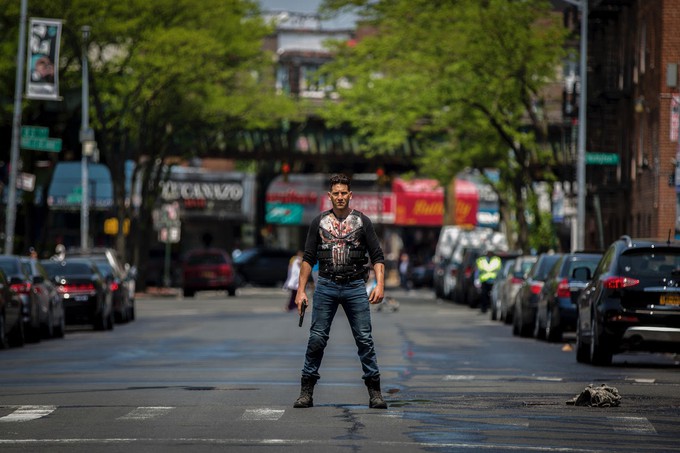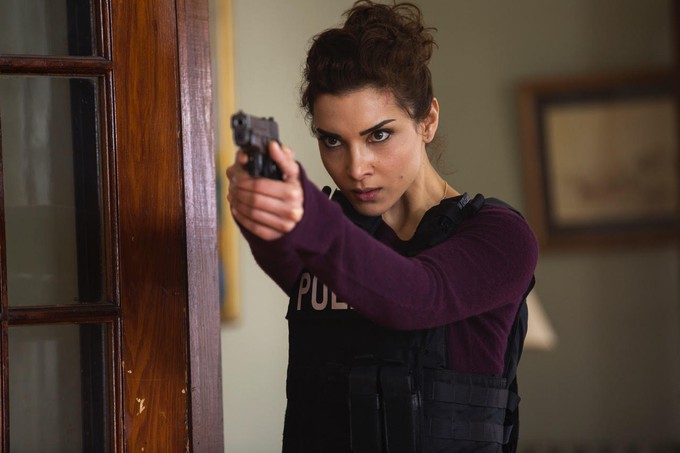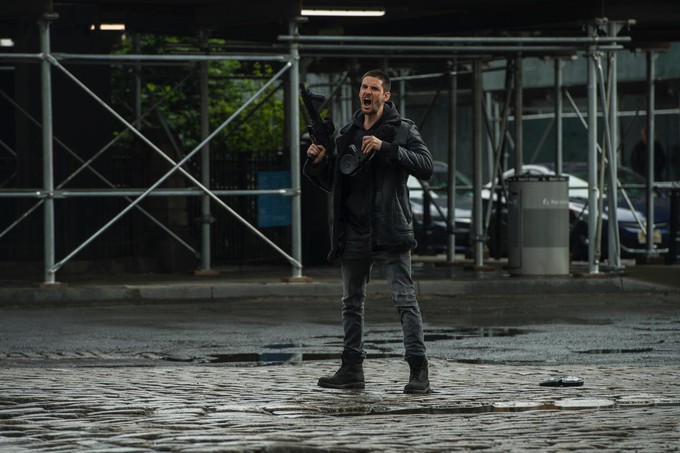
AICN’s Russ Sheath here,
If there’s a word that spills out of the first season of Netflix’s The Punisher it’s ‘trauma’!
In the world of The Punisher, no two characters (other than the titular character aka Frank Castle) embody suffering from the traumatic events of the first season more so than Homeland Security Agent Dinah Madani (played by actress Amber Rose Revah), and the show’s villain Billy ‘Jigsaw’ Russo (portrayed by actor Ben Barnes).
I spoke with Amber and Ben about their characters, and all things The Punisher, in preparation for the arrival of Season 2 on Netflix this Friday.
Russ Sheath (RS): Guys, how are you both?
Ben Barnes (BB): We’re really good.
Amber Rose Revah (AR): We’re well, how are you?
RS: I’m very good, thank you for asking. I guess with you guys in LA and me in the UK, you are certainly in the better climate for this time of year?
BB: You know, it’s absolutely pissing down with rain here, it’s torrential (laughs).
AR: It follows me around from London, we feel very at home right now.
RS: Thank you both for speaking to me today. The first thing that I want to say is, as a veteran myself, to thank you both for how you’ve depicted people in uniform and the challenges that veterans can face, in both seasons of The Punisher.
AR: Thank you so much. That really does mean a lot.
BB: Thanks, man. Jon (Bernthal) really does lead from the front in that regard and I’ve heard him say on more than one occasion that he makes this show for veterans and to really satisfy those people who have made that commitment.
There’s a powerful military background to the character of The Punisher and that means a great deal to a lot of people. This is a show where none of the characters have powers, but if you have a skill set then it has to be based on something real, even for my character. In the second season my character is a fractured mess and unfortunately, that is not too distant from a lot of people’s experiences, so it’s our duty to ground it any way we can.

RS: What kind of preparation did each of you do to get into the mindset for where you knew your characters were going in season 2?
AR: When we found out the second season was going ahead, Steve (Lightfoot, The showrunner for both Season 1 and 2 of The Punisher) gave me an idea of where Dinah was going. Part of it was trying to understand, psychologically, what she was going through, and Dinah was already so damaged from season one and from her experiences of having been in Afghanistan, so I wanted to give some truth to that.
In the second season, from what Billy (Russo aka Ben Barnes’ ‘Jigsaw’) has done to her, it’s just lingered and grown within her, eating her up. I was able to gain some insight by talking to people where I work, volunteering with a mental health organization, to understanding the processes that she might have gone through mentally and what phase in that process she was at when we start the season and how she changes as the season continues.
BB: In the first season we were trying to understand some of the experiences that our characters might have been through, and Amber went and spent some time at the Department of Homeland Security and heard about the experiences of some of the people who work there.
For myself, obviously you have to do all the gun training and things like that, but it’s also more than that, as you physicalize how you walk with a particular kind of rifle, how you carry yourself day to day and how you stand, that kind of thing.
Fortunately, I was set up with some ex-Marines and some military experts, but I was listening to their stories and watching the way they move as much as I was listening to the actual lesson they were teaching.
In the second season, I really wanted to ground the trauma that Billy goes through, following the fight with Frank at the end of season one. I wanted to ground it in something real and Steve gave me these articles from National Geographic which were about veterans using ‘art therapy masks’ which are something that are being used for real, more and more.
Billy abuses that increasingly as we go through the second season, but it was grounded in something very real, where personnel who are coming back from serving and, just because you can’t see the injuries on the outside, it doesn’t mean that they aren’t burning on the inside and they use these masks to help portray how they feel.
That was something that Frank Castle understood, and he was trying to leave Billy with these marks so that he would look in the mirror and understand what he had done, but being the narcissist that he is, Billy doesn't understand shame and guilt or process emotions in the way that other people do.
One of my first ports of call was my mother, who is a psychotherapist, and my father is a professor of schizophrenia. Both of them have an understanding of mental health problems and were helpful in helping me to understand the dynamics of that kind of therapy.
It was an amazing basic resource but neither of them had worked with veterans, so I was reliant on reading about veterans specifically, and I was keen to share some of that research on Twitter so people could understand some of the dialogue that didn’t make the cut.
AR: We were both keen to make our characters as truthful as possible to what people may have been through.
RS: Building on that point. You are both British and of course, US law enforcement and the military are different in many ways to those in the UK. Was there a learning curve involved in portraying characters?
AR: For me it was a huge learning curve with the gun training that I did, speaking to Homeland Security agents and all that kind of stuff, but was a really enjoyable learning curve.
BB: For myself, I don’t have a military background, but you almost want to trick yourself into believing that you have, for example by adapting the way you are training in the gym to emulate how they would train. I also watched a lot of documentaries, not just about the US Marines but also about the British SAS, to help myself be in that mindset.
RS: It’s great that you are both speaking to me together because after the conclusion of season one your characters were on such an inevitable collision course. Did you have much input into how that relationship played out and what kind of preparation did you do for those scenes?
BB: We weren’t sure what interactions our characters would have because we got the scripts one at a time, every couple of weeks as we were shooting. We knew from the first script that Madani was going to be obsessed with Billy’s state of mind and obsess over whether he was being manipulative again or whether it was something more real that was affecting him.
You had the intimacy that we built in the first season, so it’s easier to play scenes where there’s conflict and where you are trying to make someone fearful if you have played those intimate scenes and developed trust, it makes that dynamic something that you feel safe to play in.
AR: There’s also a lot that happens in the room, in the moment. So when Ben is giving it his all, as Jigsaw, physically you feel scared, intimidated, confused…. all of those things feed into my own performance.
BB: That trust allows me to feel ok try to unsettle not only Dinah but also Amber. You have that ability if you have built up a level of trust between you.
RS: Is that tension something you have to climb down from? Or is it something you can simply step out from?
AR: It’s interesting as I think different actors work so differently. With myself, I can be a bit boring, where I’m in the corner by myself….
BB: It’s focus.
AR: It is focus, but some actors can switch into it ‘just like that’. I’ve always wished that I could do that, but because this is a very dark season for Dinah, I did find myself having to just sit and focus to try and get that level of intensity.
BB: I did a film with Robert De Nero and he only gave me one piece of advice, which was about being able to focus on the take which is on you, and being able to organize your day so you can have your focus being at it’s most heightened, in those moments. He told me that it was something he was still trying to master.
With these long 14 hour days, you have to be aware at all times, because you are never sure when those important moments, which are going to really resonate with somebody, are going to come.
RS: Madani, who didn’t come from any aspect of The Punisher comics, while Russo is probably the most noted Punisher bad guy from the comic books. Does having, or not having source material to go to, afford certain freedom as actors?
AR: I think it was a bit of a dichotomy for me.
When we started season one, obviously you have all these questions about your character but I didn’t have anything to refer to. I think that came from my own insecurities, and about making the character as truthful as I could, especially whereas I saw the others and they had something to go by.
The other side to the argument is that, with comic book characters, there will always be different interpretations of them that people want to see.
I’m sure Ben can talk about this himself, but with his iteration of the character of Jigsaw, it’s going to be so brilliant for the fans to watch because it comes from a moment of truth, which is really interesting.
BB: I completely agree. The last thing you want to do is let down your core demographic of passionate people who love these comics and want to see them on the screen.

At the same time, I think there’s a duty to keep making each new show and each new season feel really fresh, vibrant, alive and different. People enjoy going back to films that they love, but at the same time, you also want to sit down on a Friday night and watch something that you haven’t seen and be thrilled by it.
We are just trying to have some fresh blood course through those veins by making it a bit more challenging and have the characters be a bit muddier and less predictable so that it makes for an exciting show.
Thanks to both Amber and Ben for their time in speaking with me.
Follow Amber Rose Revah on twitter @AmberRoseRevah
And Ben Barnes @Benbarnes
Punisher Season 2 goes full auto on Netflix this Friday 18th January.
